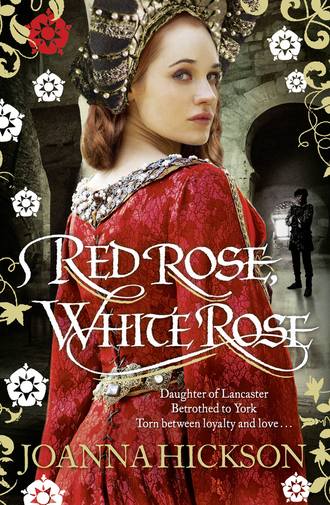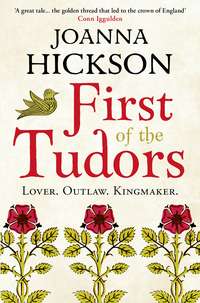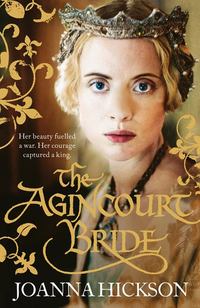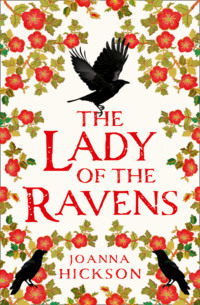
Полная версия
Red Rose, White Rose
I set about trying to extract myself from the gorse but my skirts had become entangled and sharp prickles pierced my clothes and scratched me painfully. When I stopped struggling to take a rest I noticed that the sound of the chase had diminished and the cries of birds were once more audible in the air. A few loose stones rattled close by and I felt a presence looming over me. Tipping my head back I found myself staring up at a richly trapped horse with a knight in armour on its back. Clearly the fighting was over because he had removed his helmet. Thick, neatly cut flaxen hair framed a suntanned face distinguished by a high brow, a straight nose and a pair of piercing grey eyes. He bowed politely from his saddle.
From my prone position almost anyone would have looked imposing but when he dismounted, making little of the encumbrance of steel-plate, I saw that he was tall and broad-shouldered, the belt on his jupon lying low on slim hips; but my attention was caught by the jupon itself: blood-red and cross-slashed by a white saltire cross, at its centre a black bull’s head. The X cross and the black bull were devices I knew. I did not recognize his face but this could only be a Neville knight.
Incongruously, he bowed. ‘God save you, my lady, are you hurt?’
My temper flared. Manners were one thing, I thought, but was he blind? Could he not see that I was gagged and tied? He must have seen the anger blaze in my eyes for he quickly bent and untied the filthy kerchief, pulling it from my mouth and gazing at it with distaste before throwing it away into the gorse. ‘That does not look pleasant,’ he said and beckoned to someone beyond my eye-line. ‘Bring a wine-skin, Tam,’ he ordered. ‘Lady Cicely needs a drink.’
My eyes widened. So he knew who I was, even though I wore no distinguishing badge. My heart missed a beat as he drew his dagger but he hastened to reassure me. ‘I will not harm you. It is to cut your bonds.’
With relief I felt my wrists fall apart and I was at last able to haul my skirt off the clutching bushes and clamber to my feet. I noticed several rips in my clothing where the gorse had done its damage but worse was the taste in my mouth, as if my tongue had been dragged through a midden. I stood gasping at clean air like a stranded fish and rubbing my chafed wrists.
Being taller than average I could meet Sir John’s enquiring gaze straight on. ‘I cannot thank you enough for your intervention, sir,’ I said, embarrassed that my voice emerged in a frog-like croak. I cleared my throat. ‘I was out hawking with my brothers and fleeing from one pack of reivers when another gang ambushed me. Did you catch any of them or see any of my hunting party?’
The knight ignored my questions. ‘Was it you or the horse they were after?’
I drew myself up. ‘One of them boasted that they would get a good price for the horse and a queen’s ransom for me.’
He raised an eyebrow. ‘Is that so? I heard you were soon to be a duchess but is not “queen” aiming a little too high?’
For a stranger he was far too knowledgeable. I was about to demand his name when the young squire Tam appeared at my side offering a wine-skin and suddenly the evil taste in my mouth was of vastly more importance. Murmuring thanks I sucked at it greedily, swilled the wine around my mouth and, abandoning good manners, turned away to spit it into the gorse.
The knight indicated my injured horse standing nearby, three-legged, her head drooping. ‘I believe you would hold your price, Lady Cicely, but I fear the same cannot be said of your mare.’
This was the second time he had used my name and title and I was becoming irritated. ‘You have the advantage of me. You seem to know who I am but I do not know you.’
His smile transformed him from merely good-looking to strikingly handsome. A complete set of even white teeth was seldom to be seen in a fighting man, which he so obviously was. ‘But you know I am a Neville from my jupon,’ he said, placing his hand over the black bull on his chest. ‘Sir John Neville of Brancepeth, brother to the Earl of Westmorland.’
‘Ah.’
It was a shamefully inadequate response but the revelation had given me a severe jolt. I had not shared the conversation in my mother’s solar for the past three years without hearing a great deal about the present Earl of Westmorland et al. Far from being rescued by a knight in shining armour, I may have escaped from the cauldron only to fall into the fire.
2
Weardale and Brancepeth Castle
Cicely
‘You appear disconcerted, Lady Cicely,’ said Sir John.
I made no response, merely staring at him, my mind filling with random memories and snippets of information. The Nevilles were an extremely large family and I was woefully ignorant of the undercurrents that steered the relationships within it.
‘As I see it, we have only one problem,’ Sir John went on, ignoring my bewilderment and addressing the immediate practicalities, ‘your horse cannot be ridden and my destrier is the only one strong enough to carry two people. So I hope you will accept a lift from me, unless of course you prefer to walk.’
I looked around. The knight’s retinue had been moderately successful; none appeared injured and two of my recent abductors now stood with their hands bound, the ropes tied to the panniers on either side of the sumpter horse which carried the knight’s baggage. One of them was the wizened man but I could not see the face of the other, nor could I see their ponies. Wherever the two captives were being taken, they were clearly going on foot. I had no intention of doing the same.
‘The last time I rode on the pommel of a knight’s saddle it was in front of my father,’ I said, ‘when I was seven.’
Sir John turned to the young man who had brought the wineskin. ‘Tam, get my bedroll and tie it over the front of my saddle. For the comfort of Lady Cicely.’
I had lost my hat in the fall and my unruly hair was loose, tumbling down my back and no doubt tangled with spikes of gorse. In my torn skirts and mud-stained riding huke, with my wild mass of auburn hair, I was conscious of looking more like a camp follower than a future duchess. I remarked pointedly, ‘If someone could find my hat in the gorse, it would prevent my hair blowing in Sir John’s face while we ride.’
As I had hoped, Tam glanced up from his task. ‘I will find it for you, my lady,’ he said with a shy smile. He did not wear a knight’s spurs and I guessed he was no more than twenty.
I smiled back and thanked him but Sir John frowned. ‘Make it quick, Tam. We must be going.’
This prompted me to ask the question uppermost in my mind. ‘And where are we going, Sir John?’
‘To Brancepeth of course,’ he replied tersely.
Brancepeth was Lord Westmorland’s castle, some twenty miles distant, on the road to Durham. It was not the answer I wanted to hear. ‘Surely Raby is more or less on the way?’ I pointed out.
He shook his head. ‘It is a detour and I must get to Brancepeth before nightfall. I will send a message with one of my men to let your mother know where you are.’
I forced a smile. ‘Thank you, Sir John. My mother will be relieved. I hope the present Countess of Westmorland will not object to accommodating a guest from Raby.’
Ignoring my remark he turned impatiently to inspect the squire’s efforts with the bedroll. ‘That will do, Tam. Now fetch Lady Cicely’s hat and let us be on our way. We will leave her injured horse here. Without doubt there will be a search party and they will find the mare.’
When Tam stirruped his hands to help me mount the destrier, Sir John looked surprised to see me settle myself astride the padded pommel, arranging my skirts modestly on either side of the horse’s withers. However he made no comment and swung himself quickly up behind me. The rest of his retinue fell into line, Tam leading the sumpter with the two prisoners attached. Since we could only progress at their walking pace I had to concur with my companion’s assertion that we would hardly reach Brancepeth castle by dusk.
In addition to the discomfort of riding on the pommel, I felt ill at ease at being thrown so close to this undeniably attractive man. Not since my father’s enthusiastic embraces during my childhood had I ever been physically so close to any male, even my brothers. It was impossible to avoid contact with him and I confess that I found it disturbingly exciting. Sir John remained silent behind me and, clinging to the mane of his big bay stallion as it sidled and pecked at the unaccustomed weight, I distracted myself by mentally analysing my situation. Brancepeth Castle was the seat of Ralph Neville, second Earl of Westmorland, and it should follow that I would be kindly treated there and returned as soon as possible to my home at Raby. But recent family history told me that this was far from certain.
At first sight the dispute between the Nevilles of Raby and the Nevilles of Brancepeth appeared to arise directly from my father’s death, but what was actually at the root of the family feud was my parents’ marriage. For both it had been a second marriage. My father had already sired seven children, and his first wife died giving birth to the eighth. I do not know what caused the death of my mother’s first husband, only that she was a widow at eighteen with two young daughters. And so there were already several infants in the nursery at Raby even before she and my father added another eleven children – theirs was undoubtedly a passionate love match. It would have been thirteen if twin boys had not sadly died within hours of their birth and almost taken our mother with them. I was the youngest of the family and I knew that the man whose saddle I now shared was my father’s grandson. The fact that I had never met him before was some indication of the distance of our relationship, even though as blood kin we should have had a close affinity. Paradoxically and through no fault of our own, we did not.
Although he had been dead for seven years, I still thought of my father as a giant among men, in every sense of the word. He had, indeed, been extremely tall – a head taller than most of his fellow noblemen, a physical feature I had inherited, being as tall as most men and towering over many. He had also been considered clever, charming and ruthless, a skilled soldier and one of the most successful military and political tacticians of his generation. However, when it came to writing his will his tactics had been, let us say, questionable. The Westmorland title had perforce to follow the senior male line but, controversially, he left most of his property to his second wife, my mother. Therefore while Sir John’s older brother Ralph, the second Earl of Westmorland, held and resided at Brancepeth Castle, my mother held the three other Neville palaces, Raby and two vast castles in Yorkshire, together with all their manors and other sources of revenue. As may be imagined, this arrangement had not gone down well with the Nevilles of Brancepeth, who resented what they called blatant favouritism and frequently found ways to express their resentment and press home their claim to a greater legacy. My fear was that I might be used as a tool to further their cause.
After plodding in silence across high moorland tracks for a couple of hours, passing several well-fortified farms, we dropped down into a dale where a small but sturdy castle stood sentinel over a bridge spanning a fast-flowing river. The crossing was guarded by a posse of men-at-arms, who saluted Sir John. As we rode through, one of them shouted a bawdy comment about the knight’s ‘saddle-doxy’ which Sir John studiously ignored but which had the effect of breaking the tense silence that had developed between us.
‘I must apologize for the guards’ uncouth manners, my lady,’ he said when out of their earshot. ‘They do not recognize you or they would not dare.’
‘Whose men are they?’ I asked. ‘And what castle is this?’
‘It is Witton Castle, held by Sir Ralph Eure, a tenant of my brother the earl. We have just crossed the River Wear.’
‘Only half way to Brancepeth then?’ I glanced at the western sky, where clouds were already blushing faintly pink.
I could not see Sir John’s face but I felt him tense in the saddle. ‘Yes, we make slow progress – too slow for my liking.’ He turned to beckon the squire forward. ‘Take the reivers to the captain at the Witton guardhouse, Tam. Sir Ralph can keep them in his prison until the session judge comes to Durham. We will water the horses while you sort it out.’
I watched the old reiver, the wizened man who had earlier held the reins of my mare, as he stumbled away behind the sumpter horse. No longer grinning, he now looked weary and desperate. I thought he would be grateful to sit down, even in a stinking dungeon, and very nearly summoned a pang of sympathy, until I remembered his sinister remark about me doing a dance. There was no doubt in my mind that he would have had no sympathy for me had I been subjected to whatever pain or humiliation ‘dance’ was a euphemism for. At least I had escaped the ‘dance’, whatever the unknown future I was riding into might have in store.
Presently we joined a well-trodden highway where a milestone indicated seven miles to the city of Durham, and I knew that we were nearing Brancepeth. This was mining country and the high moor above the road to the north was peppered with numerous adits, holes that had been opened into the hillside, and a web of paths leading between them, worn by the feet of miners and the wheels of the carts. They wove a pattern across the winter-brown grass of the slopes down to the river where the coal was brought for transport to the coast. I knew that these mines were an important source of income to the Brancepeth estate; without them the earl would have been even more impoverished than he claimed to be.
Before the end of our journey I became sleepy and, despite my best efforts, must have slumped back against my companion who punctiliously nudged me upright again. ‘Take care you do not slumber, my lady, in case you fall from the horse,’ he said. ‘It is not far now.’
‘Talk to me then,’ I urged irritably. ‘Tell me why you happened to be riding that drover’s track when you rescued me from the reivers.’
I thought he was going to maintain his stubborn silence because there was a lengthy pause before he launched into his reply. ‘The young man, Tam, who found your hat, is the Clifford heir and a ward of the earl’s. We had been attending a Halmote – a manor court – at Brough Castle and, if you want the truth, we always take the high route over the moors because that way we avoid crossing Raby lands. Surely you must realize that the sight of your home is like a red rag to the Nevilles of Brancepeth.’
Despite the grim tone of his remark I smiled, thinking of the black bull badge on his chest. ‘A red rag to a bull; yes, I see.’
‘No!’ His voice was angry. ‘I doubt if you do see, Lady Cicely. My brother is the second Earl of Westmorland – your father’s heir. Yet he has been deprived of the heir’s rightful inheritance. He should have tenure of the entire legacy of Westmorland – all its lands and all its castles. All of them – and the income they provide. And it should be up to him as their lord how those lands and castles are occupied and stewarded. Instead he was left only one seat – Brancepeth – and not even enough manors to provide his immediate family with homes and livelihoods. He and his dependents have been slighted and disinherited by your overweening, greedy mother.’
Now it was my turn to be angry. True, my mother was proud and sometimes haughty but she was a great lady of royal blood, a granddaughter of King Edward the Third, and I could not brook her being held in contempt. ‘My mother has served the honour of Westmorland more profitably than any of the present earl’s family and it is hardly chivalrous to speak thus of a great lady, Sir John.’ I laid particular stress on the ‘sir’.
‘Which is why it is better if we do not speak at all,’ the knight snapped back.
After this a heavy silence prevailed once more until we came within sight of our destination. I knew the history of Brancepeth from my childhood lessons. An advantageous union three hundred years ago had brought the manor and its castle into the Neville family when Geoffrey de Neville, grandson of William of Normandy’s Admiral of the Fleet, had married Emma, the heiress of Bertram Bulmer of Brancepeth. Heraldic wordplay on the Bulmer name had brought the black bull device into the Neville crest. It was an alliance which had marked the start of Neville dominance over the sprawling County Palatine of Durham. Many times had the warlike Prince Bishops of Durham taken up arms to defend the English border against the Scots, but bishops came and went by papal appointment, whereas succeeding generations of Nevilles had dug their roots deep into the denes and dales, establishing themselves among the clutch of great marcher clans on which successive kings of England relied to defend the northern fringes of their realm.
Brancepeth was a four-square fortress; its thirty-foot-high curtain enclosed a hall, chapel and bailey with a sturdy tower at each corner and a formidable gatehouse protected by stout barbicans. Defensively perched on the edge of a steep-sided dene or gorge, through which a fast stream flowed, its ochre-coloured stone was blackened by soot from burning the coal mined on its demesne and it loomed dark and grim in the deepening twilight. We approached through a closed and quiet village, where I could picture the villeins clustered around their hearths, filling their bellies with their evening meal. My own stomach rumbled at the thought. Only a few spluttering torches lit our way under the gatehouse into a flagged courtyard where a flight of steps led to the arched entrance of the great hall. There was a loud rattle of chains as the drawbridge was raised behind us; a sinister sound in the gathering gloom.
Sir John dismounted and helped me to do so, speaking to an eager page who had rushed forward to hold his stirrup. ‘Tell the countess there is a guest. Lady Cicely Neville. I will bring her to the hall.’
As the page hurried away up the steps I saw a mop-headed little boy wriggle from the clutches of his nursemaid and scurry towards us, ducking and weaving through the confusion of horses and men, his little face bright with curiosity.
‘You have brought a visitor, Uncle,’ he said in a high, sibilant voice. ‘Who is she?’
With a frisson of pleasure, despite myself, I saw the knight’s transforming smile once more as he greeted the boy with an affectionate cuff on the shoulder and a mild rebuke. ‘Where are your manners, Jack? Make your best bow to your kinswoman Lady Cicely Neville, and then you may take my helmet to the armoury.’
Pink-faced, the boy bent his knee and bowed his head to me, shyly keeping his eyes lowered. I guessed he must be the heir of Westmorland, whose birth I remembered being discussed with some surprise at Raby – surprise because it demonstrated that the earl, commonly described as a cripple, was not entirely disabled. The little boy proudly took the proffered helmet and carried it away, staggering slightly under its weight, and Sir John and I both watched his progress. He was closely followed by Tam Clifford leading the laden sumpter and the knight’s weary warhorse to the stable, a long timber structure built against the high perimeter wall.
All around us was clatter and chatter as the retinue dismounted and began leading their horses away. Reverting once more to cool courtesy, Sir John indicated the narrow stone staircase which hugged the hall wall. A pair of helmeted halberdiers guarded the iron-bound oak doors that stood open at the top. ‘Will you enter, my lady?’
His stern expression deterred any thought of refusal but as I ascended I felt the first stirrings of alarm, wondering what I would find within and when I would ever descend. Sir John’s armoured feet rang threateningly close behind me on the stair. We passed through the iron-bound doors into an ante-room, then up a shorter and wider stone stairway, through a carved wooden screen into a long, high-beamed hall warmed by two blazing fires, one on the dais at the far end and another under a carved hood in the body of the hall. As we entered, a lady dressed in a crimson fur-trimmed gown and a cream linen wimple emerged from a privy door onto the dais. A deep frown creased her brow and her thin mouth was set in a downward curve. She made no move to greet us.
Apart from a servant tending the fires the three of us were alone in the large room. If a meal had already been served there was no sign of it and the trestles had been cleared. Two cushioned chairs were set near each hearth and various wooden coffers and benches lined the walls, which were hung with dusty tapestries depicting aspects of the chase. Fading light seeped through high-set shuttered windows and guttering torches filled the room with sinister shadows. My anxious gaze met no reassurance.
His hand firmly on my elbow, Sir John drew me towards the dais and the frowning lady, who glared down at me. ‘Lady Cicely, may I present my sister-in-law, Lady Elizabeth, Countess of Westmorland.’ While I made an equal’s curtsy he turned to her. ‘This is Lady Cicely Neville of Raby, sister. She was the unfortunate victim of reivers who attacked her hawking party out on the moor. I was obliged to come to her aid.’
Lady Elizabeth voiced none of the customary words of greeting. ‘But were you obliged to bring her here, Sir John?’ she asked, blue eyes frosty in the tight frame of her wimple. ‘She is hardly welcome.’
Stung by this insult I protested. ‘Believe me, Lady Westmorland, I would have been more than happy to return immediately to Raby but this gallant knight insisted we come first to Brancepeth.’ My use of the term ‘gallant knight’ was laced with irony.
‘I am astonished to learn that your mother allowed you to venture on to the moors at all.’ Lady Elizabeth’s tone was as sharp as my own. ‘I should have thought the dowager countess would be more protective of her precious duchess-to-be.’
I freely admit that I am quick-tempered and I showed it then. ‘You seem determined to offer me nothing but scorn, my lady, but at least I am here to defend myself. I consider it churlish to slight my mother when she is not.’
The countess seemed to gather herself up, like a goaded cat, her whole body shaking with repressed rage. ‘Churlish! It is she who is churlish in the extreme and remains so while she holds lands and castles that are my lord’s by right. There is no welcome for one of Joan Beaufort’s children under this roof while she lives under a roof that is legally his and withholds from him lands and revenues that should be his also.’
She swept down from the dais and stalked past me to the great hearth with the carved hood where she seated herself in one of the two chairs placed there. I started to follow, fulminating. I was only vaguely familiar with the terms of my father’s will but I did know that commissions of inquiry in both London and Durham had confirmed its legacies and settled its terms.
I turned angrily on Sir John. ‘Since I am declared unwelcome I should be given the courtesy of a horse and an escort and allowed to leave. Or am I, in fact, a hostage, sir?’
The knight denied me eye contact and shrugged. A squire had entered the hall and began removing Sir John’s armour, kneeling to unbuckle the greaves from his shins. ‘I have sent word to Raby that you are here,’ Sir John said. ‘We must wait and see how your family construes the situation.’
‘I imagine their “construing” will depend on the content of the message you have sent,’ I retorted.
As the corselet was lifted from his shoulders a faint smile flickered across the knight’s face and was gone. ‘Indeed it will, Lady Cicely. To be precise then, I have told the dowager countess that you are free to leave as soon as we hear that the castles of Middleham and Sherriff Hutton have been handed over to my brother’s agents.’
These words fell between us with the impact of a cannon shot. Middleham and Sherriff Hutton were the two vast Neville estates in Yorkshire, the original foundation of the family’s assets. Lady Westmorland gave a little crow of delight; her hand flew to her mouth and her eyes began to glitter with gleeful excitement.






